- Back to Home »
- Election effect
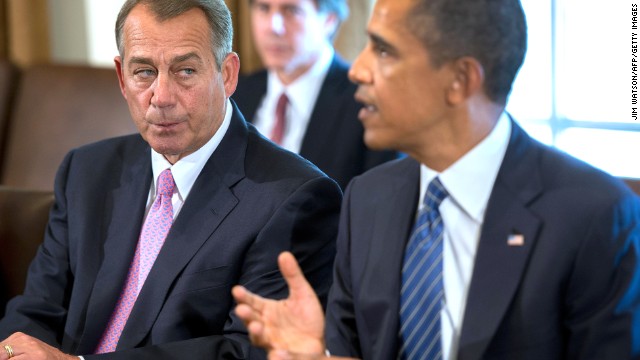
- The 2014 and 2016 elections influence how Congress will vote on a Syria strike
- Possible White House contenders craft political messages
- Splits exist in both parties on ideological and political grounds
- Legislators fear backing military action could bring primary challenges
Washington (CNN) -- The closer Congress gets to voting on whether to back President Barack Obama's call for a military attack on Syria, the more election politics influences the debate.
Splits exist on both the left and right, revealing the political calculations of Washington regarding next year's congressional elections and the 2016 presidential vote.
While the 2014 contests faced by every House member and a third of the Senate are more proximate, the machinations at work in debating and acting on the Syria issue also are heavily focused on the balloting three years from now to choose Obama's successor.
 A Free Syrian Army fighter looks through a hole from behind sandbags, while a fellow fighter reads the Quran in Deir Ezzor, Syria, on Tuesday, September 3. The United States and other Western nations blame the Assad regime for a chemical weapons attack that's believed to have killed more than 1,400 people. Tensions in Syria began to flare in March 2011 and escalated into an ongoing civil war. Click through to view the most compelling images taken since the start of the conflict:
A Free Syrian Army fighter looks through a hole from behind sandbags, while a fellow fighter reads the Quran in Deir Ezzor, Syria, on Tuesday, September 3. The United States and other Western nations blame the Assad regime for a chemical weapons attack that's believed to have killed more than 1,400 people. Tensions in Syria began to flare in March 2011 and escalated into an ongoing civil war. Click through to view the most compelling images taken since the start of the conflict: 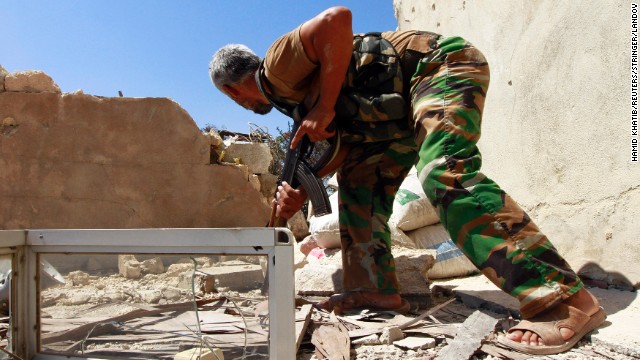 A Free Syrian Army fighter takes cover as he watches forces loyal to President Bashar al-Assad near Hanano barracks in Aleppo on September 3.
A Free Syrian Army fighter takes cover as he watches forces loyal to President Bashar al-Assad near Hanano barracks in Aleppo on September 3. 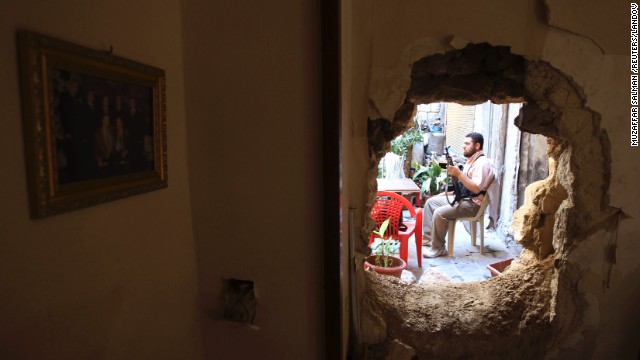 A Free Syrian Army fighter is seen through a hole in a wall of a building in Aleppo on September 3.
A Free Syrian Army fighter is seen through a hole in a wall of a building in Aleppo on September 3. 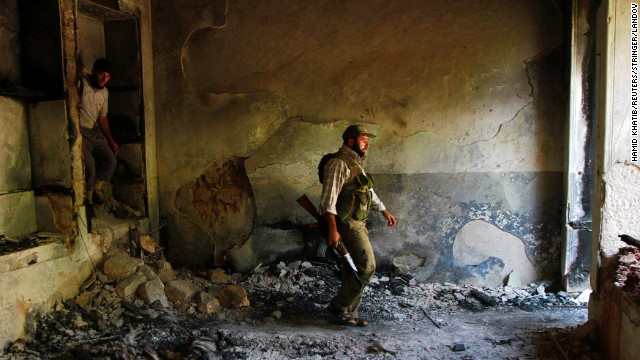 Free Syrian Army fighters walk inside a damaged house in Aleppo on September 3.
Free Syrian Army fighters walk inside a damaged house in Aleppo on September 3.  A Free Syrian Army fighter walks through a hole in a wall in Aleppo on September 3.
A Free Syrian Army fighter walks through a hole in a wall in Aleppo on September 3. 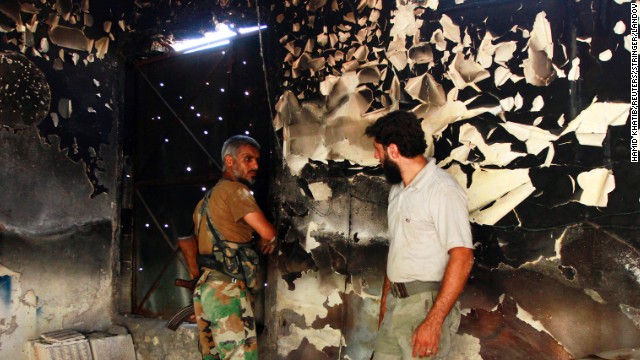 Free Syrian Army fighters talk inside a burnt house in Aleppo on September 3.
Free Syrian Army fighters talk inside a burnt house in Aleppo on September 3. 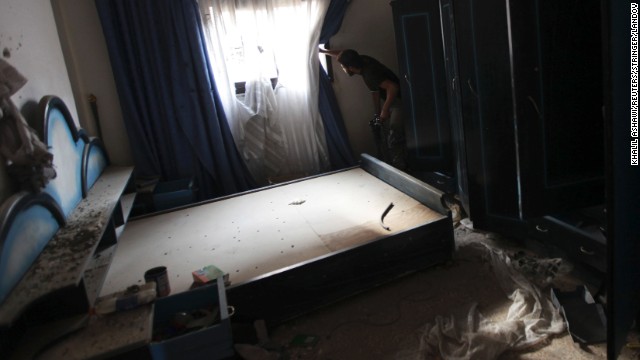 A Free Syrian Army fighter peeks through the curtains of a bedroom in Deir ez-Zor, Syria, on Monday, September 2.
A Free Syrian Army fighter peeks through the curtains of a bedroom in Deir ez-Zor, Syria, on Monday, September 2.  Free Syrian Army fighters take their positions behind piled sandbags, as one of them points his weapon, in Deir ez-Zor on September 2.
Free Syrian Army fighters take their positions behind piled sandbags, as one of them points his weapon, in Deir ez-Zor on September 2. 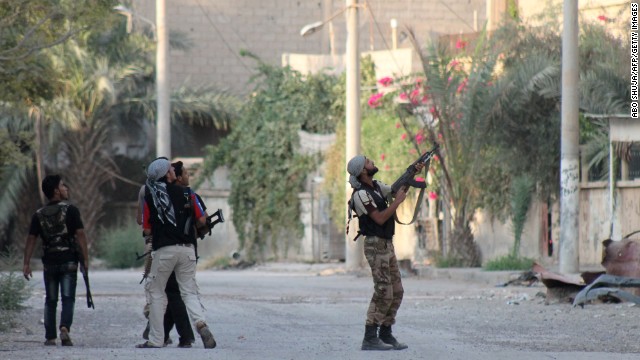 A rebel fighter points his weapon at Syrian regime forces in Deir ez-Zor on September 2.
A rebel fighter points his weapon at Syrian regime forces in Deir ez-Zor on September 2. 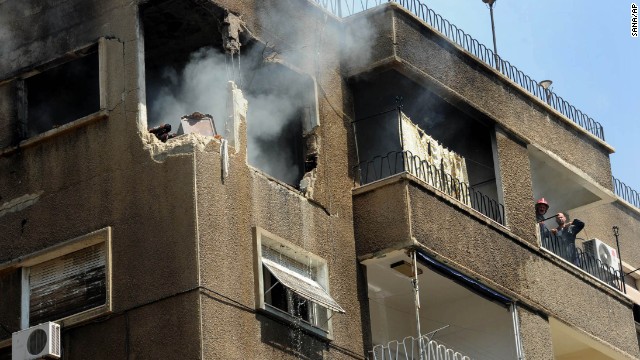 Syrian firefighters try to extinguish a fire after a missile hit a residential building in Damascus, Syria, on September 2.
Syrian firefighters try to extinguish a fire after a missile hit a residential building in Damascus, Syria, on September 2. 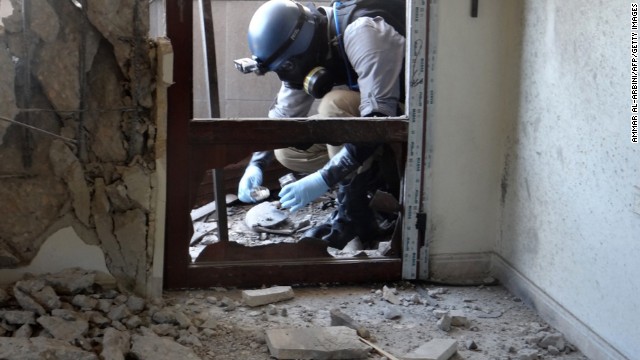 A U.N. arms expert collects samples during an inspection of a suspected chemical weapons strike site in the Ghouta area outside Damascus on August 29.
A U.N. arms expert collects samples during an inspection of a suspected chemical weapons strike site in the Ghouta area outside Damascus on August 29.  People search for belongings in rubble in Raqqa, Syria, on August 29.
People search for belongings in rubble in Raqqa, Syria, on August 29. 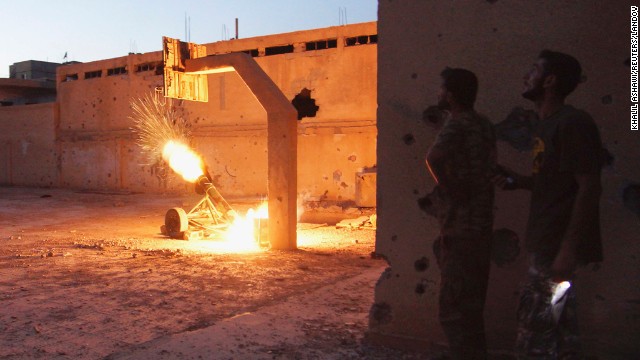 Free Syrian Army fighters launch a rocket toward forces loyal to Syrian President Bashar al-Assad in Deir Ezzor on August 29.
Free Syrian Army fighters launch a rocket toward forces loyal to Syrian President Bashar al-Assad in Deir Ezzor on August 29.  A Syrian Kurd uses hay to hide another woman in a training session organized by the Kurdish Women's Defense Units on Wednesday, August 28, in a northern Syrian border village. They're preparing if the area comes under attack.
A Syrian Kurd uses hay to hide another woman in a training session organized by the Kurdish Women's Defense Units on Wednesday, August 28, in a northern Syrian border village. They're preparing if the area comes under attack.  Free Syrian Army fighters escort U.N. vehicles with chemical weapons experts on August 28 through a site of a suspected chemical weapons attack outside Damascus.
Free Syrian Army fighters escort U.N. vehicles with chemical weapons experts on August 28 through a site of a suspected chemical weapons attack outside Damascus. 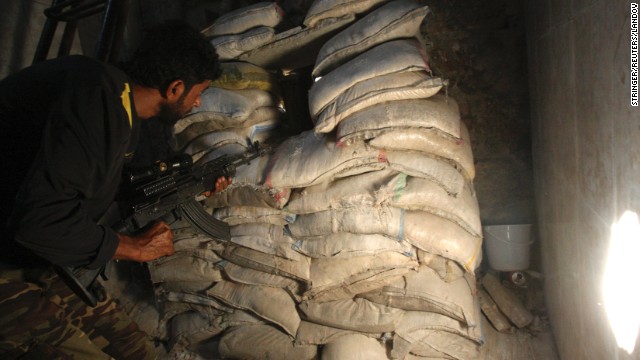 A Free Syrian Army fighter takes position behind sandbags in the old city of Aleppo, Syria, on Tuesday, August 27.
A Free Syrian Army fighter takes position behind sandbags in the old city of Aleppo, Syria, on Tuesday, August 27. 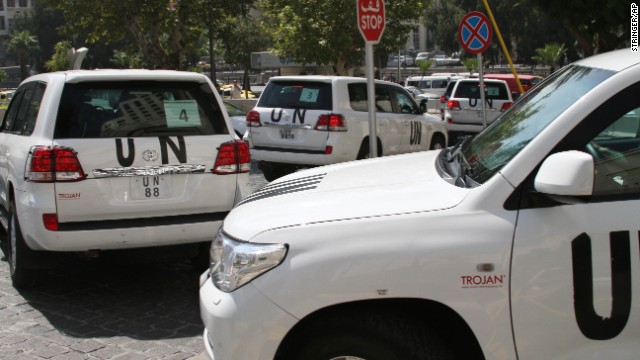 A U.N. team leaves its Damascus, Syria, hotel in a convoy on Monday, August 26. The team was to investigate an alleged chemical attack that killed hundreds last week in a suburb of the Syrian capital. Sniper fire hit a vehicle used by the U.N. chemical weapons investigation team multiple times Monday, according to the United Nations.
A U.N. team leaves its Damascus, Syria, hotel in a convoy on Monday, August 26. The team was to investigate an alleged chemical attack that killed hundreds last week in a suburb of the Syrian capital. Sniper fire hit a vehicle used by the U.N. chemical weapons investigation team multiple times Monday, according to the United Nations. 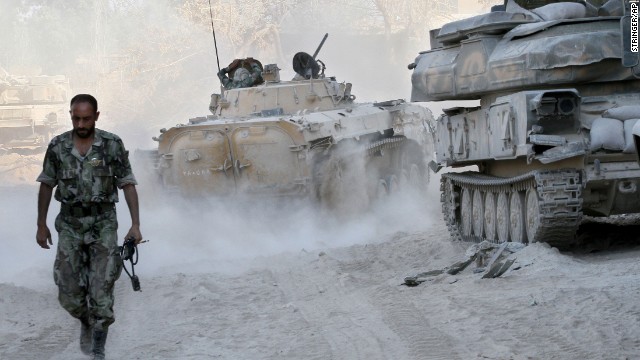 A Syrian soldier walks down a street in Damascus on Saturday, August 24.
A Syrian soldier walks down a street in Damascus on Saturday, August 24.  Pigeons lie dead on the ground on August 24 from after what activists say is the use of chemical weapons by government forces in the Damascus suburb of Arbeen.
Pigeons lie dead on the ground on August 24 from after what activists say is the use of chemical weapons by government forces in the Damascus suburb of Arbeen. 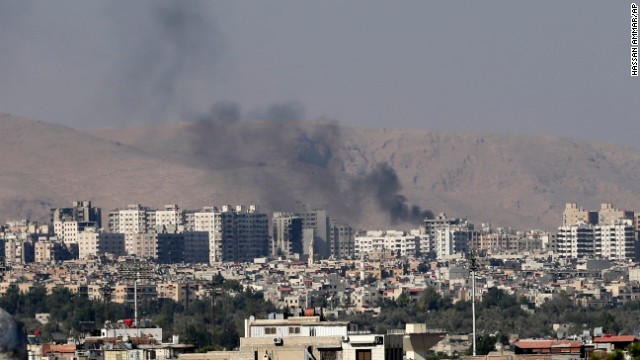 Columns of smoke rise in Barzeh after heavy shelling on Friday, August 23.
Columns of smoke rise in Barzeh after heavy shelling on Friday, August 23. 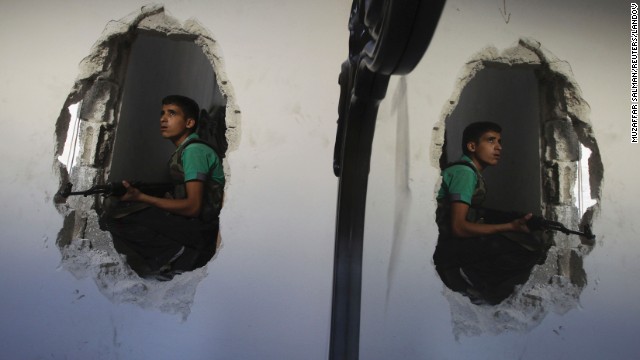 A young Free Syrian Army fighter is reflected in a mirror as he takes position in a house in Aleppo on Thursday, August 22.
A young Free Syrian Army fighter is reflected in a mirror as he takes position in a house in Aleppo on Thursday, August 22. 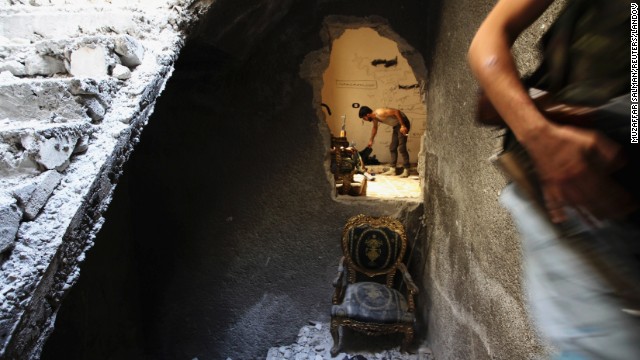 Rebels move around a building in Aleppo on August 22.
Rebels move around a building in Aleppo on August 22.  Syrian rebels claim pro-government forces used chemical weapons to kill citizens outside Damascus on Wednesday, August 21. People inspect bodies in this photo released by the Syrian opposition Shaam News Network.
Syrian rebels claim pro-government forces used chemical weapons to kill citizens outside Damascus on Wednesday, August 21. People inspect bodies in this photo released by the Syrian opposition Shaam News Network.  People search the rubble of a bombed building in Aleppo, Syria, on Friday, August 16.
People search the rubble of a bombed building in Aleppo, Syria, on Friday, August 16.  Men bury the bodies of six members of the same family killed in a bombing in Raqqa on Saturday, August 10.
Men bury the bodies of six members of the same family killed in a bombing in Raqqa on Saturday, August 10.  Syrian Army soldiers patrol a devastated street in Homs on Wednesday, July 31.
Syrian Army soldiers patrol a devastated street in Homs on Wednesday, July 31. 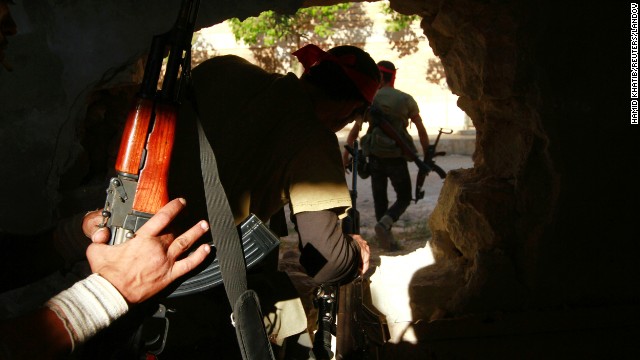 Free Syrian Army fighters move through a hole in a wall in Khan al-Assal on Monday, July 22, after seizing the town.
Free Syrian Army fighters move through a hole in a wall in Khan al-Assal on Monday, July 22, after seizing the town. 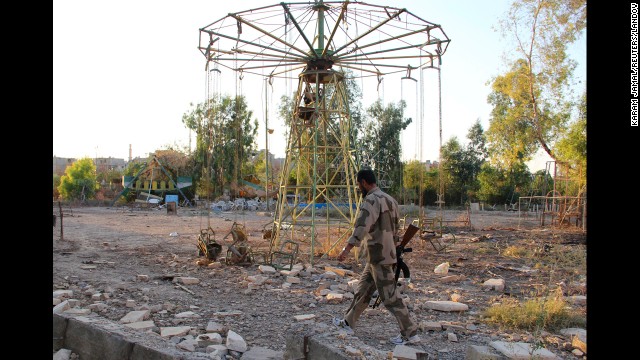 A rebel fighter walks past swings in a deserted playground in Deir al-Zor, Syria, on Sunday, July 21.
A rebel fighter walks past swings in a deserted playground in Deir al-Zor, Syria, on Sunday, July 21. 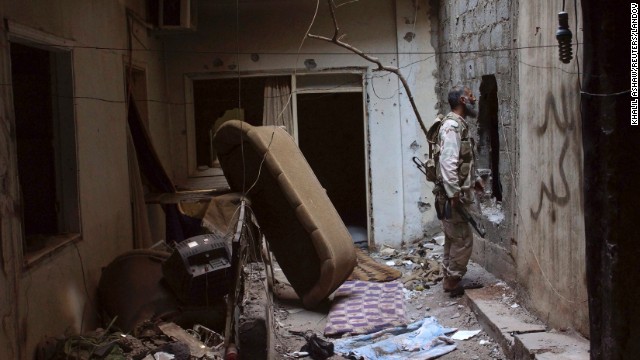 A rebel fighter speaks with a fellow fighter through a hole in a wall in Deir al-Zor on July 21.
A rebel fighter speaks with a fellow fighter through a hole in a wall in Deir al-Zor on July 21. 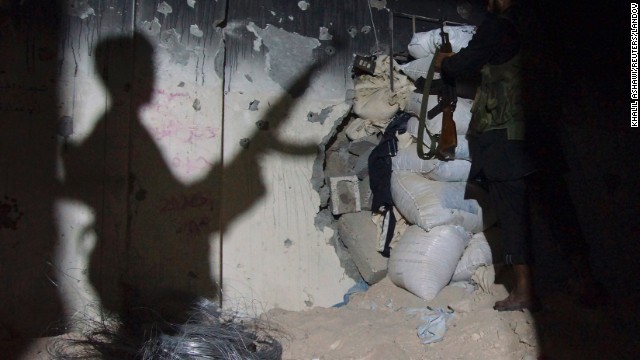 A Free Syrian Army fighter casts a shadow on a wall as he carries his weapon in a shelter in Deir al-Zor on Thursday, July 18.
A Free Syrian Army fighter casts a shadow on a wall as he carries his weapon in a shelter in Deir al-Zor on Thursday, July 18.  Yahya Sweed, 13, is comforted by his father as he lies on a bed in Kfar Nubul on Tuesday, July 16. The boy was injured by shrapnel, resulting in the amputation of his right leg.
Yahya Sweed, 13, is comforted by his father as he lies on a bed in Kfar Nubul on Tuesday, July 16. The boy was injured by shrapnel, resulting in the amputation of his right leg. 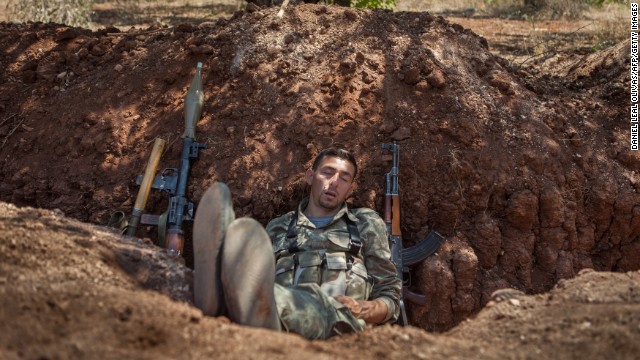 A rebel fighter naps in a trench about 300 feet from the Syrian government forces' positions along the highway connecting Idlib with Latakia on Monday, July 15.
A rebel fighter naps in a trench about 300 feet from the Syrian government forces' positions along the highway connecting Idlib with Latakia on Monday, July 15. 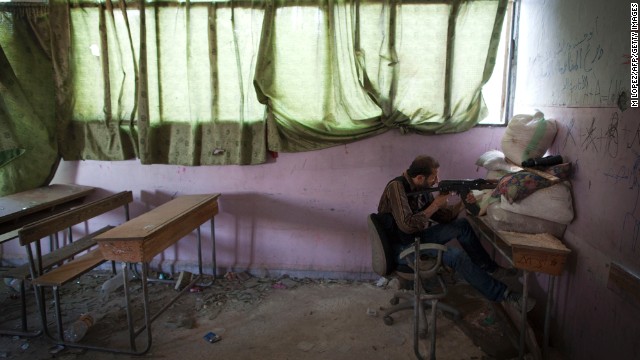 A rebel fighter uses a hole in the wall of a destroyed school to aim at Syrian government forces in the Izaa district of Aleppo on Sunday, July 14.
A rebel fighter uses a hole in the wall of a destroyed school to aim at Syrian government forces in the Izaa district of Aleppo on Sunday, July 14.  A Free Syrian Army fighter uses a mirror to scope out snipers loyal to Syrian President Bashar al-Assad in Aleppo on Friday, July 12.
A Free Syrian Army fighter uses a mirror to scope out snipers loyal to Syrian President Bashar al-Assad in Aleppo on Friday, July 12.  A Free Syrian Army fighter stands over a boy who was injured during shelling in Al-Bara on Monday, July 8.
A Free Syrian Army fighter stands over a boy who was injured during shelling in Al-Bara on Monday, July 8.  Members of the Free Syrian Army fire a homemade rocket toward regime forces in Deir al-Zor on Sunday, June 16.
Members of the Free Syrian Army fire a homemade rocket toward regime forces in Deir al-Zor on Sunday, June 16.  Syrian rebels leave their position in the northwestern town of Maaret al-Numan on Thursday, June 13. The White House said that the Syrian government has crossed a "red line" with its use of chemical weapons and announced it would start arming the rebels.
Syrian rebels leave their position in the northwestern town of Maaret al-Numan on Thursday, June 13. The White House said that the Syrian government has crossed a "red line" with its use of chemical weapons and announced it would start arming the rebels.  Forces loyal to Syrian President Bashar al-Assad are seen near Qusayr on Thursday, May 30.
Forces loyal to Syrian President Bashar al-Assad are seen near Qusayr on Thursday, May 30.  Syrian rebels take position in a house during clashes with regime forces in the old city of Aleppo on May 22.
Syrian rebels take position in a house during clashes with regime forces in the old city of Aleppo on May 22. 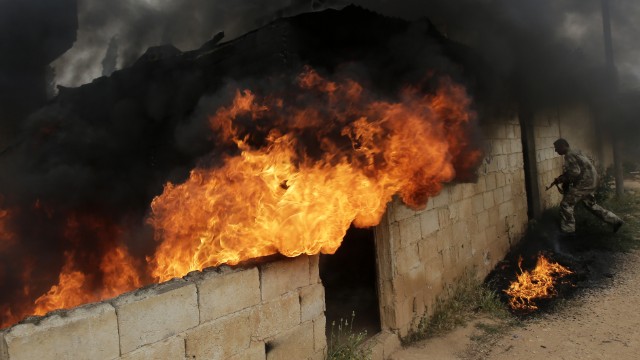 Syrian army soldiers take control of the village of Western Dumayna north of the rebel-held city of Qusayr on Monday, May 13. Syrian troops captured three villages in Homs province, allowing them to cut supply lines to rebels inside Qusayr town, a military officer told AFP.
Syrian army soldiers take control of the village of Western Dumayna north of the rebel-held city of Qusayr on Monday, May 13. Syrian troops captured three villages in Homs province, allowing them to cut supply lines to rebels inside Qusayr town, a military officer told AFP. 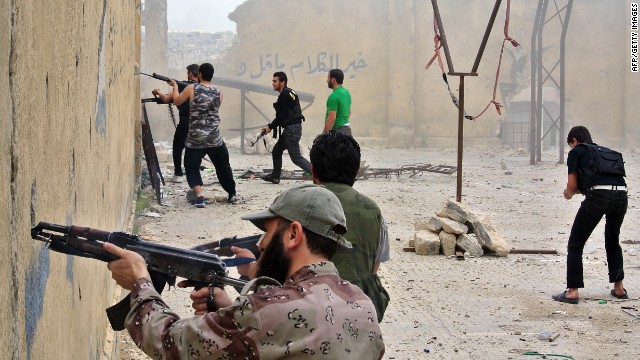 Rebel fighters fire at government forces in the northern Syrian city of Aleppo on Sunday, May 12.
Rebel fighters fire at government forces in the northern Syrian city of Aleppo on Sunday, May 12.  Searchers use a flashlight as they look for survivors among the rubble created by what activists say was a missile attack from the Syrian regime, in Raqqa province, Syria, on April 25.
Searchers use a flashlight as they look for survivors among the rubble created by what activists say was a missile attack from the Syrian regime, in Raqqa province, Syria, on April 25. 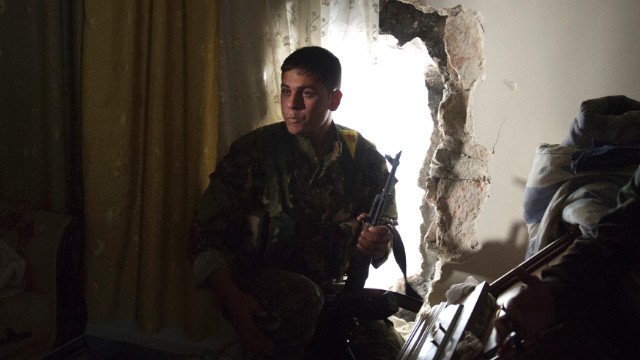 A Kurdish fighter from the "Popular Protection Units" (YPG) takes position inside a building in the majority-Kurdish Sheikh Maqsood area of Aleppo, on Apri. 21.
A Kurdish fighter from the "Popular Protection Units" (YPG) takes position inside a building in the majority-Kurdish Sheikh Maqsood area of Aleppo, on Apri. 21.  People walk past destroyed houses in the northern Syrian town of Azaz on Sunday, April 21.
People walk past destroyed houses in the northern Syrian town of Azaz on Sunday, April 21. 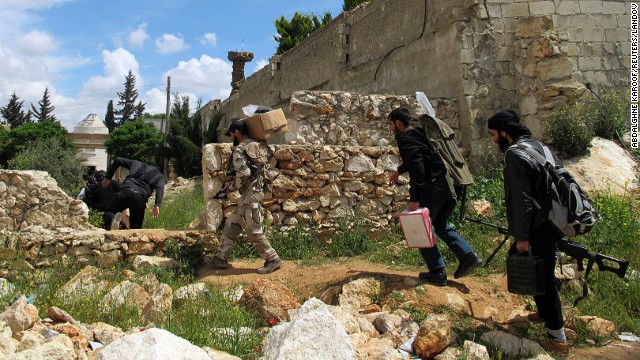 Free Syrian Army fighters take positions prior to an offensive against government forces in the Khan al-Assal area, near Aleppo on Saturday, April 20.
Free Syrian Army fighters take positions prior to an offensive against government forces in the Khan al-Assal area, near Aleppo on Saturday, April 20. 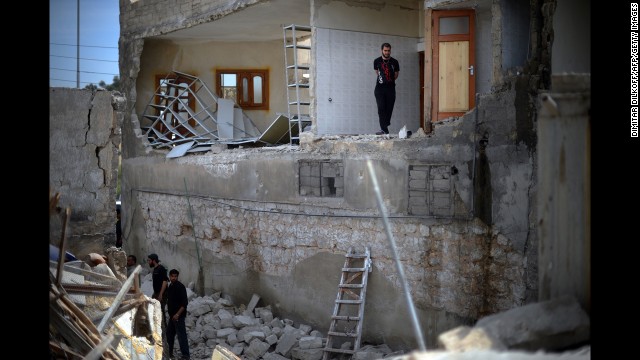 Men inspect damage at a house destroyed in an airstrike in Aleppo on April 15.
Men inspect damage at a house destroyed in an airstrike in Aleppo on April 15.  Syrian and Kurdish rebel fighters walk in the Sheikh Maqsud district of Aleppo on April 14.
Syrian and Kurdish rebel fighters walk in the Sheikh Maqsud district of Aleppo on April 14. 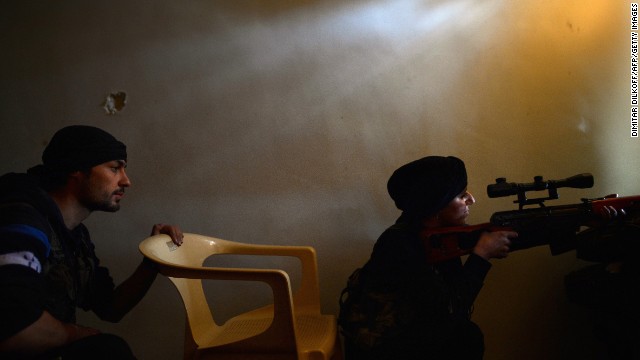 A female rebel monitors the movement of Syrian government forces in Aleppo's Sheikh Maqsud neighborhood on Thursday, April 11.
A female rebel monitors the movement of Syrian government forces in Aleppo's Sheikh Maqsud neighborhood on Thursday, April 11. 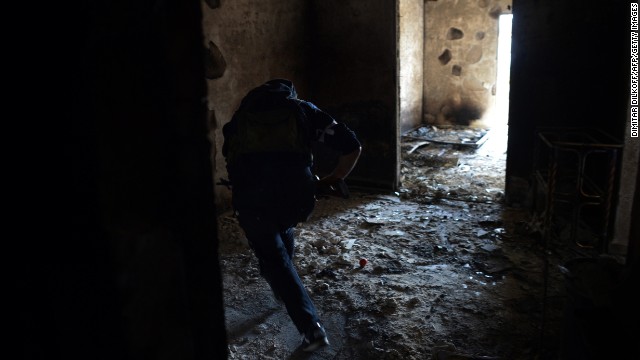 A rebel runs to avoid sniper fire from Syrian government forces in Aleppo on April 11.
A rebel runs to avoid sniper fire from Syrian government forces in Aleppo on April 11. 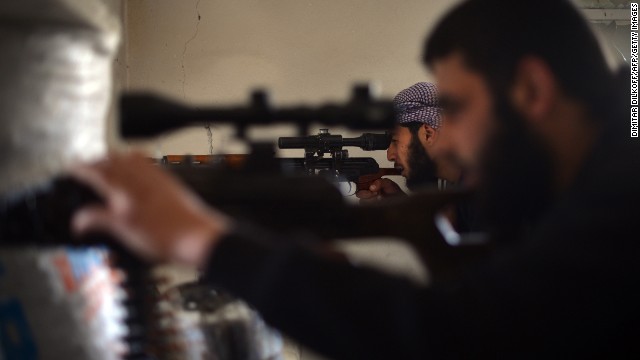 Syrian rebels observe the movement of Syrian government forces around Al-Kendi hospital in Aleppo on Wednesday, April 10.
Syrian rebels observe the movement of Syrian government forces around Al-Kendi hospital in Aleppo on Wednesday, April 10.  Rescue teams and security forces check out the scene of a deadly car bomb explosion in Damascus on April 8.
Rescue teams and security forces check out the scene of a deadly car bomb explosion in Damascus on April 8.  The fighting has taken a toll on buildings in Aleppo's Saladin district, seen here on April 8.
The fighting has taken a toll on buildings in Aleppo's Saladin district, seen here on April 8.  A Syrian rebel runs for cover in Deir ez-Zor on April 2.
A Syrian rebel runs for cover in Deir ez-Zor on April 2. 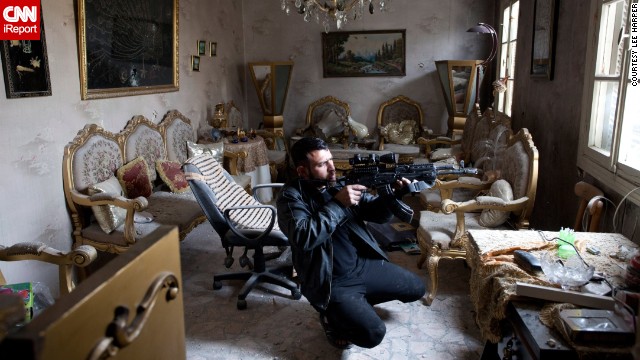 A rebel checks for snipers across the street toward the Citadel in Aleppo, Syria, on Saturday, March 30, in this photo taken by iReporter Lee Harper.
A rebel checks for snipers across the street toward the Citadel in Aleppo, Syria, on Saturday, March 30, in this photo taken by iReporter Lee Harper. 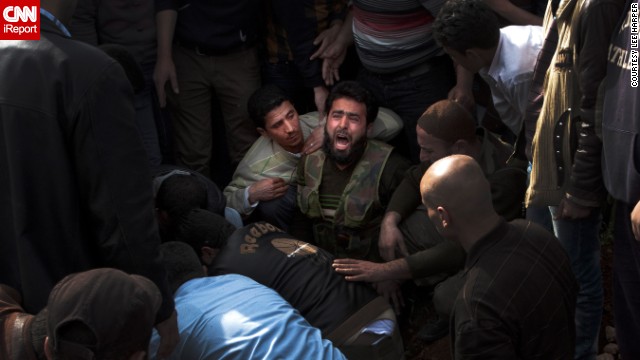 A Free Syrian fighter mourns the death of a friend in Aleppo on March 30, in this photo taken by iReporter Lee Harper.
A Free Syrian fighter mourns the death of a friend in Aleppo on March 30, in this photo taken by iReporter Lee Harper.  A Syrian opposition fighter runs for cover from Syrian army snipers in Aleppo on Wednesday, March 27.
A Syrian opposition fighter runs for cover from Syrian army snipers in Aleppo on Wednesday, March 27. 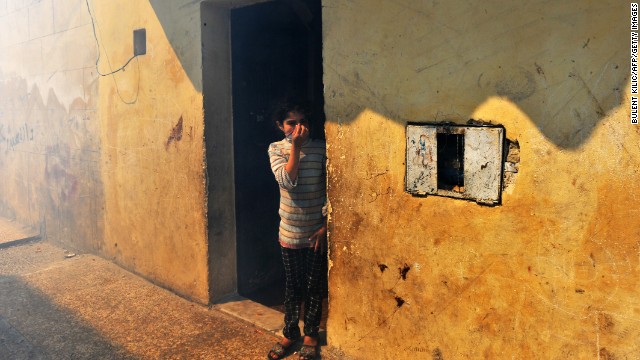 A Syrian girl covers her face to protect herself from fumes as a street covered with uncollected garbage is fumigated in Aleppo on Sunday, March 24.
A Syrian girl covers her face to protect herself from fumes as a street covered with uncollected garbage is fumigated in Aleppo on Sunday, March 24.  A Syrian man and his family drive past damaged buildings in Maarat al-Numan, on Wednesday, March 20.
A Syrian man and his family drive past damaged buildings in Maarat al-Numan, on Wednesday, March 20.  Syrians carry the body of a Syrian army soldier during a funeral ceremony in Idlib province on Tuesday, March 19.
Syrians carry the body of a Syrian army soldier during a funeral ceremony in Idlib province on Tuesday, March 19. 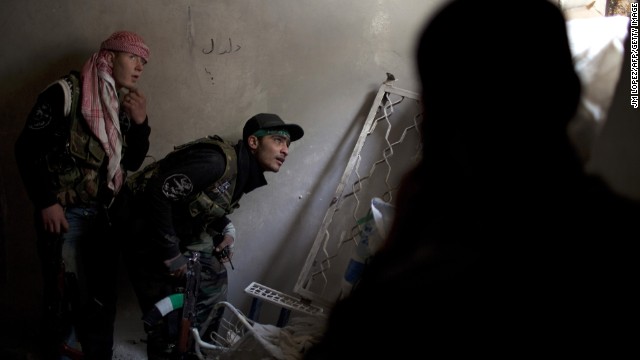 Syrian rebels take position in Aleppo, the largest city in the country, on March 11.
Syrian rebels take position in Aleppo, the largest city in the country, on March 11.  Syrian men search for their relatives amongst the bodies of civilians executed and dumped in the Quweiq River on March 11.
Syrian men search for their relatives amongst the bodies of civilians executed and dumped in the Quweiq River on March 11. 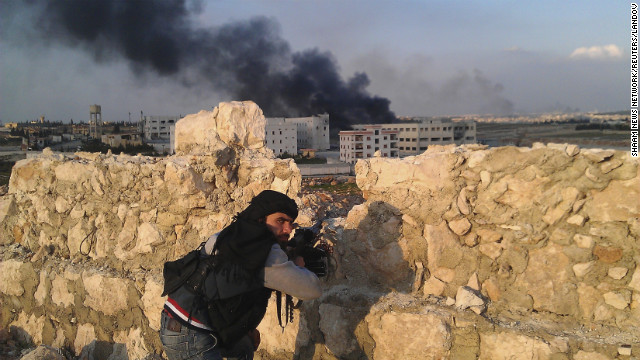 A Free Syrian Army fighter looks back as smoke rises during fighting between rebel fighters and forces loyal to Syria's President Bashar al-Assad on the outskirts of Aleppo on Saturday, March 2.
A Free Syrian Army fighter looks back as smoke rises during fighting between rebel fighters and forces loyal to Syria's President Bashar al-Assad on the outskirts of Aleppo on Saturday, March 2. 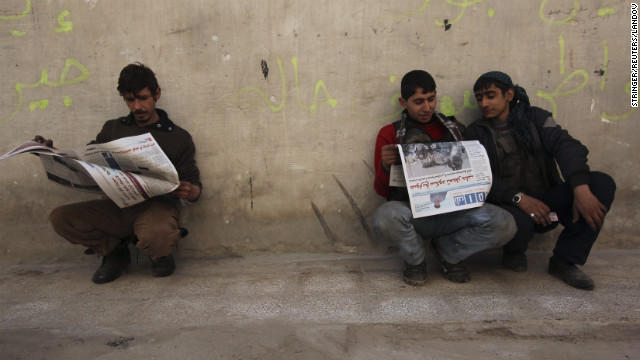 Residents read Shaam News newspapers published by the Free Syrian Army in Aleppo on March 2.
Residents read Shaam News newspapers published by the Free Syrian Army in Aleppo on March 2.  A member of the Free Syrian Army reacts to the death of a comrade who was killed in fighting, at Bustan al Qasr cemetery in Aleppo on Friday, March 1.
A member of the Free Syrian Army reacts to the death of a comrade who was killed in fighting, at Bustan al Qasr cemetery in Aleppo on Friday, March 1. 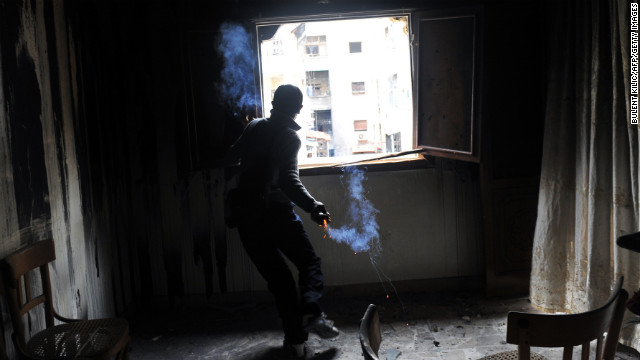 A rebel fighter throws a home-made grenade at Syrian government forces in Aleppo on February 16.
A rebel fighter throws a home-made grenade at Syrian government forces in Aleppo on February 16.  A member of the Free Syrian Army stands with his weapon as he looks at a rainbow in Aleppo on February 16.
A member of the Free Syrian Army stands with his weapon as he looks at a rainbow in Aleppo on February 16.  A Syrian woman looks through a bus window in Aleppo on February 14.
A Syrian woman looks through a bus window in Aleppo on February 14. 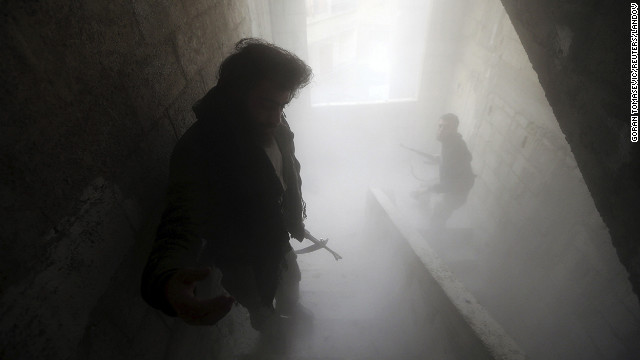 Free Syrian Army fighters walk through a dust-filled stairwell in Damascus on February 7.
Free Syrian Army fighters walk through a dust-filled stairwell in Damascus on February 7.  A Syrian rebel gestures at comrades from inside a broken armored personnel carrier in Al-Yaqubia on February 6.
A Syrian rebel gestures at comrades from inside a broken armored personnel carrier in Al-Yaqubia on February 6. 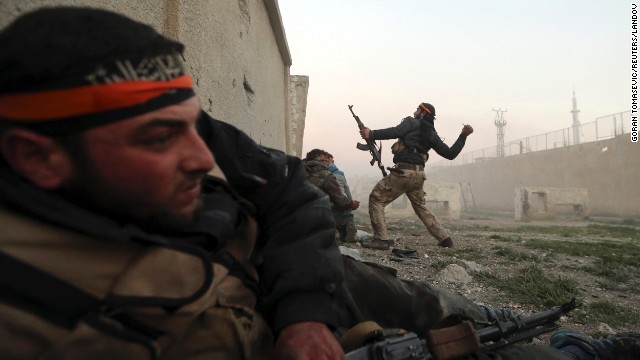 A rebel fighter throws a hand grenade inside a Syrian Army base in Damascus on February 3.
A rebel fighter throws a hand grenade inside a Syrian Army base in Damascus on February 3.  People stand in the dust of a building destroyed in an airstrike in Aleppo, Syria on February 3.
People stand in the dust of a building destroyed in an airstrike in Aleppo, Syria on February 3.  Free Syrian Army fighters run as they enter a Syrian Army base during heavy fighting in the Arabeen neighborhood of Damascus on February 3.
Free Syrian Army fighters run as they enter a Syrian Army base during heavy fighting in the Arabeen neighborhood of Damascus on February 3.  An unexploded mortar shell fired by the Syrian Army sits lodged in the ground in Damascus on January 25.
An unexploded mortar shell fired by the Syrian Army sits lodged in the ground in Damascus on January 25. 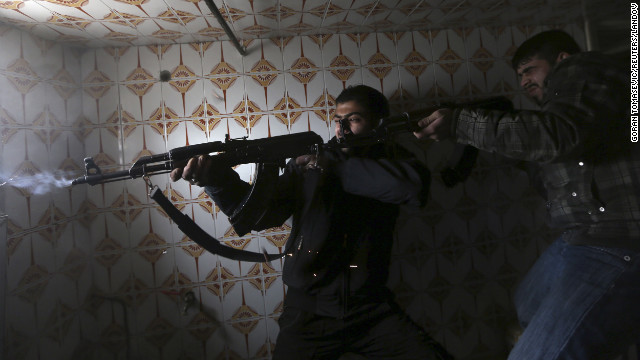 Fighters from Fateh al Sham unit of the Free Syrian Army fire on Syrian Army soldiers at a check point in Damascus on January 20.
Fighters from Fateh al Sham unit of the Free Syrian Army fire on Syrian Army soldiers at a check point in Damascus on January 20.  A Free Syrian Army fighter walks between buildings damaged during Syrian Air Force strikes in Damascus on January 19.
A Free Syrian Army fighter walks between buildings damaged during Syrian Air Force strikes in Damascus on January 19. 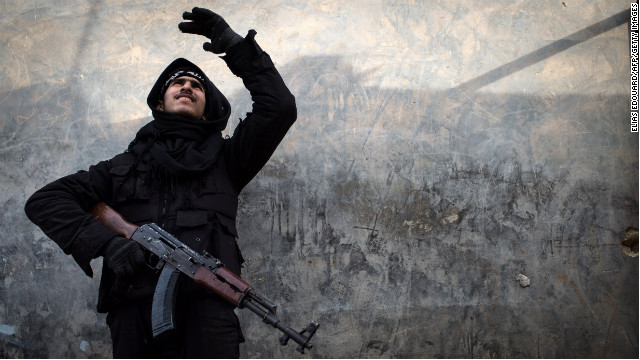 A Syrian rebel fighter tries to locate a government jet fighter in Aleppo on January 18.
A Syrian rebel fighter tries to locate a government jet fighter in Aleppo on January 18. 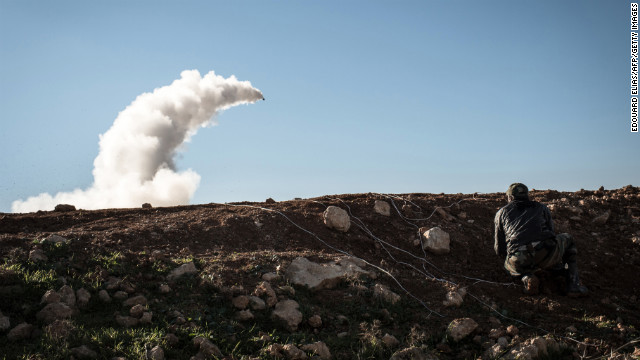 Syrian rebels launch a missile near the Abu Baker brigade in Albab on January 16.
Syrian rebels launch a missile near the Abu Baker brigade in Albab on January 16.  A Syrian boy walks near rubbish next to tents at a refugee camp near the northern city of Azaz on the Syria-Turkey border, on January 8.
A Syrian boy walks near rubbish next to tents at a refugee camp near the northern city of Azaz on the Syria-Turkey border, on January 8. 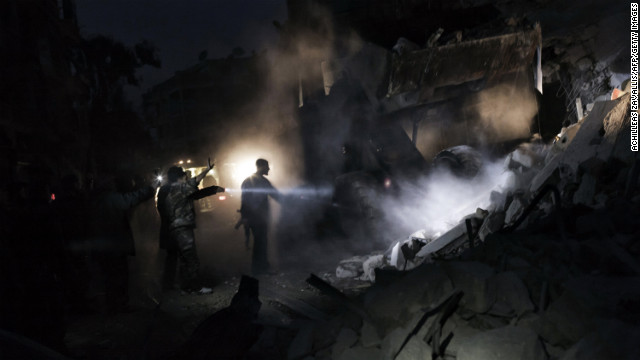 Syrians look for survivors amid the rubble of a building targeted by a missile in Aleppo on January 7.
Syrians look for survivors amid the rubble of a building targeted by a missile in Aleppo on January 7.  A father reacts after hearing of a shelling by forces loyal to Syria's President Bashar al-Assad in Aleppo on January 3.
A father reacts after hearing of a shelling by forces loyal to Syria's President Bashar al-Assad in Aleppo on January 3.  A patient smokes a cigarette at Dar Al-Ajaza psychiatric hospital in Aleppo on December 18, 2012. The psychiatric ward, housing around 60 patients, has lacked the means to function properly since fighting broke out there in July.
A patient smokes a cigarette at Dar Al-Ajaza psychiatric hospital in Aleppo on December 18, 2012. The psychiatric ward, housing around 60 patients, has lacked the means to function properly since fighting broke out there in July.  Syrians mourn a fallen rebel fighter at a rebel base in the al-Fardos area of Aleppo on December 8.
Syrians mourn a fallen rebel fighter at a rebel base in the al-Fardos area of Aleppo on December 8. 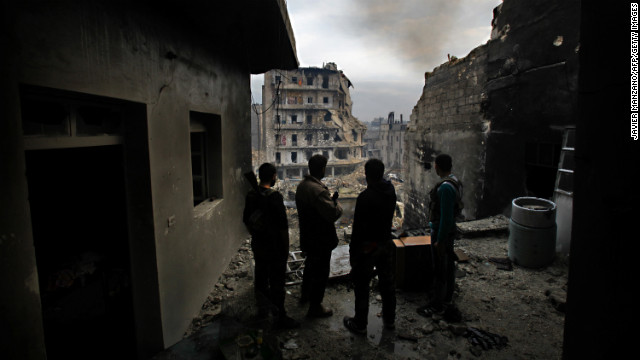 Members of Liwa (Brigade) Salahadin, a Kurdish military unit fighting alongside rebel fighters, monitor the area in the besieged district of Karmel al-Jabl in Aleppo on December 6.
Members of Liwa (Brigade) Salahadin, a Kurdish military unit fighting alongside rebel fighters, monitor the area in the besieged district of Karmel al-Jabl in Aleppo on December 6. 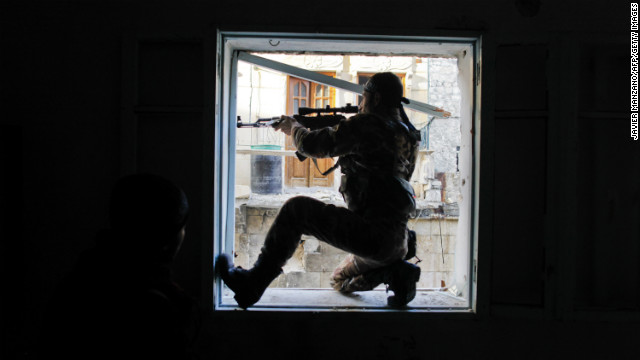 A member of Liwa Salahadin aims at a regime fighter in the besieged district of Karmel al-Jabl in Aleppo on December 6.
A member of Liwa Salahadin aims at a regime fighter in the besieged district of Karmel al-Jabl in Aleppo on December 6.  Two young boys sit underneath a washline in a refugee camp on the border between Syria and Turkey near Azaz on December 5.
Two young boys sit underneath a washline in a refugee camp on the border between Syria and Turkey near Azaz on December 5. 
 The bodies of three children, who were allegedly killed in a mortar shell attack that landed close to a bakery in Aleppo, on December 2, are laid out for identification by family members at a makeshift hospital at an undisclosed location of the city.
The bodies of three children, who were allegedly killed in a mortar shell attack that landed close to a bakery in Aleppo, on December 2, are laid out for identification by family members at a makeshift hospital at an undisclosed location of the city. 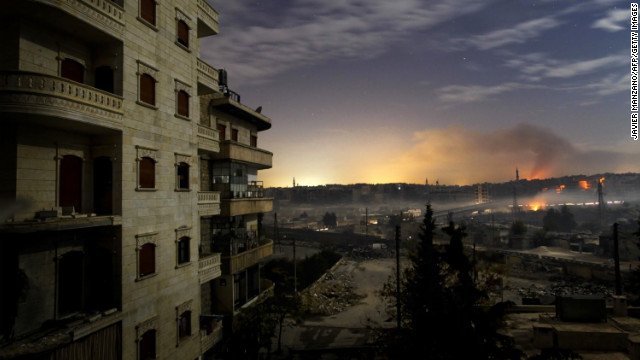 Smoke rises in the Hanano and Bustan al-Basha districts in Aleppo on December 1 as fighting continues through the night.
Smoke rises in the Hanano and Bustan al-Basha districts in Aleppo on December 1 as fighting continues through the night.  Damaged houses in Aleppo are seen after an airstrike on November 29.
Damaged houses in Aleppo are seen after an airstrike on November 29. 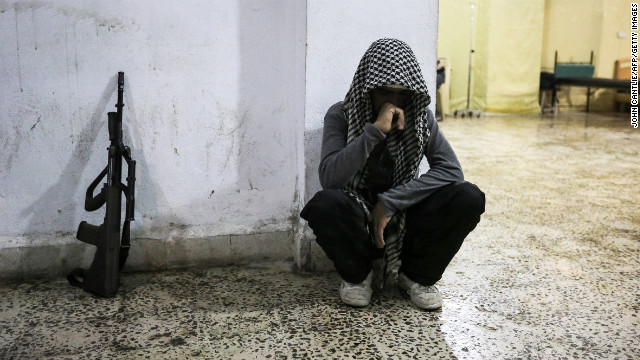 A Syrian rebel mourns the death of a comrade in Maraat al-Numan on November 20.
A Syrian rebel mourns the death of a comrade in Maraat al-Numan on November 20.  Syrians protesters stand on Assad's portrait during an anti-regime demonstration in Aleppo on November 16.
Syrians protesters stand on Assad's portrait during an anti-regime demonstration in Aleppo on November 16. 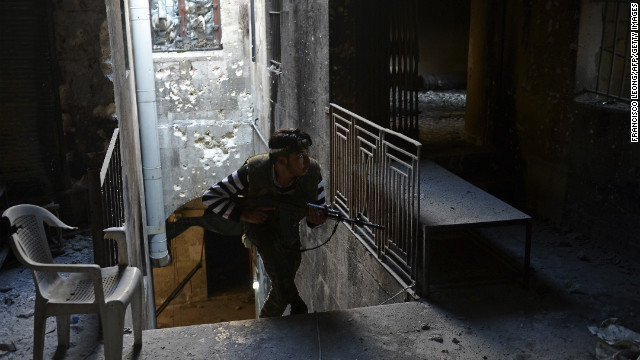 A Syrian rebel takes cover during fighting against Syrian government forces in Aleppo on November 15.
A Syrian rebel takes cover during fighting against Syrian government forces in Aleppo on November 15.  Syrian opposition fighter Bazel Araj, 19, sleeps next to his pistol in Aleppo on November 11.
Syrian opposition fighter Bazel Araj, 19, sleeps next to his pistol in Aleppo on November 11. 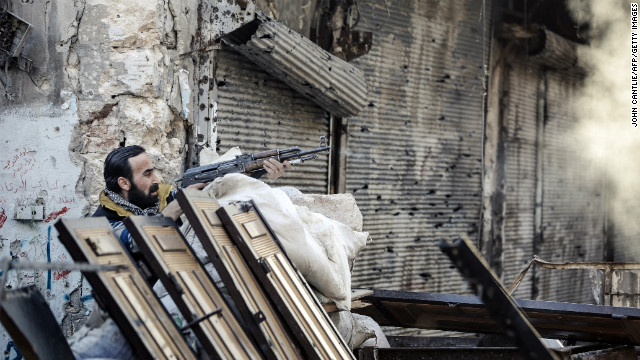 A rebel fighter fires at a Syrian government position in Aleppo on November 6.
A rebel fighter fires at a Syrian government position in Aleppo on November 6. 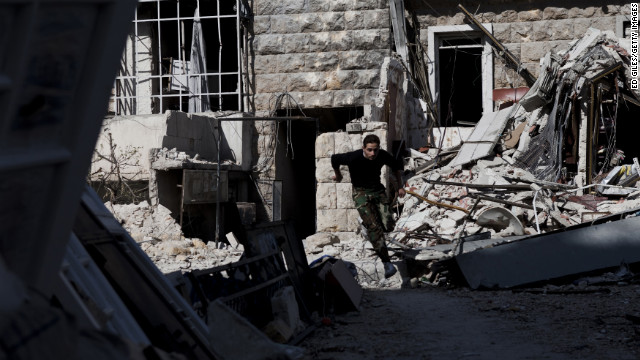 A Syrian rebel leaps over debris left in the street while running across a "sniper alley" near the Salahudeen district in Aleppo on November 4.
A Syrian rebel leaps over debris left in the street while running across a "sniper alley" near the Salahudeen district in Aleppo on November 4. 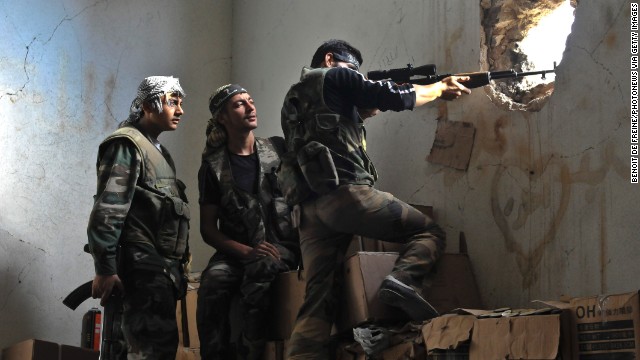 Rebels hold their position in the midst of a battle on November 3 in Aleppo.
Rebels hold their position in the midst of a battle on November 3 in Aleppo.  A man cries while being treated in a local hospital in a rebel-controlled area of Aleppo on October 31.
A man cries while being treated in a local hospital in a rebel-controlled area of Aleppo on October 31.  A man is treated for wounds after a government jet attacked the Karm al-Aser neighborhood in eastern Aleppo on October 31.
A man is treated for wounds after a government jet attacked the Karm al-Aser neighborhood in eastern Aleppo on October 31. 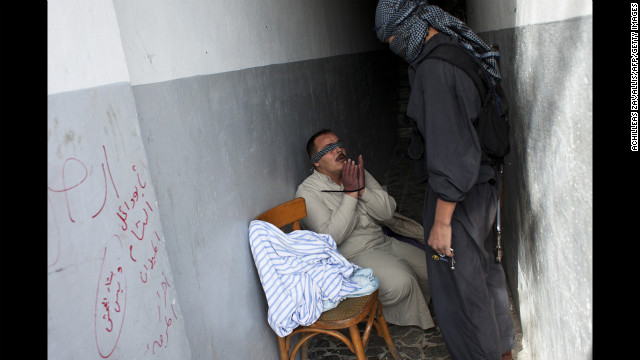 A Syrian rebel interrogates a handcuffed and blindfolded man suspected of being a pro-regime militiaman in Aleppo on October 26.
A Syrian rebel interrogates a handcuffed and blindfolded man suspected of being a pro-regime militiaman in Aleppo on October 26. 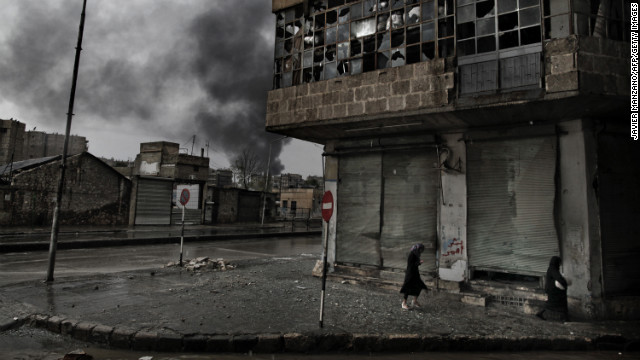 Smoke rises from a fuel station following a mortar attack as Syrian women walk on a rainy day in the Arqub neighborhood of Aleppo on October 25.
Smoke rises from a fuel station following a mortar attack as Syrian women walk on a rainy day in the Arqub neighborhood of Aleppo on October 25.  A Syrian rebel fires at an army position in the Karm al-Jabal district of Aleppo on October 22.
A Syrian rebel fires at an army position in the Karm al-Jabal district of Aleppo on October 22.  A wounded Syrian boy sits on the back of a truck carrying victims and wounded people to a hospital following an attack by regime forces in Aleppo on October 21.
A wounded Syrian boy sits on the back of a truck carrying victims and wounded people to a hospital following an attack by regime forces in Aleppo on October 21.  A man lies on the ground after being shot by a sniper for a second time as he waits to be rescued by members of the Al-Baraa Bin Malek Battalion, part of the Free Syria Army's Al-Fatah brigade, in Aleppo on October 20.
A man lies on the ground after being shot by a sniper for a second time as he waits to be rescued by members of the Al-Baraa Bin Malek Battalion, part of the Free Syria Army's Al-Fatah brigade, in Aleppo on October 20. 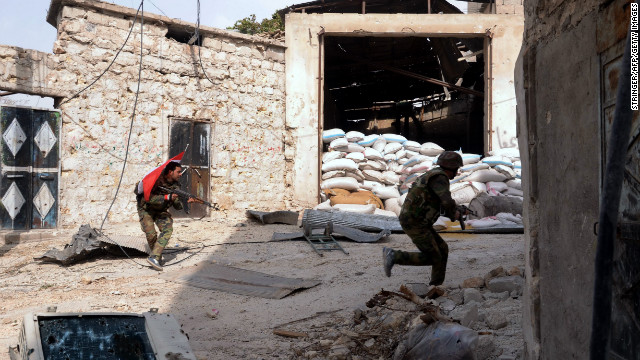 Syrian army soldiers run for cover during clashes with rebel fighters at Karam al-Jabal neighborhood of Aleppo on October 20.
Syrian army soldiers run for cover during clashes with rebel fighters at Karam al-Jabal neighborhood of Aleppo on October 20.  Smoke rises after a Syrian Air Force fighter jet fired missiles at the suburbs of the northern province of Idlib on October 16.
Smoke rises after a Syrian Air Force fighter jet fired missiles at the suburbs of the northern province of Idlib on October 16.  A Syrian opposition fighter stands near a post in Aleppo on October 11.
A Syrian opposition fighter stands near a post in Aleppo on October 11.  A Syrian man mourns the death of his father, who was killed during a government attack in Aleppo on October 10.
A Syrian man mourns the death of his father, who was killed during a government attack in Aleppo on October 10.  A rebel fighter is carried by his friends and laid on a gurney to be treated for gunshot wounds sustained during heavy battles with government forces in Aleppo on October 1.
A rebel fighter is carried by his friends and laid on a gurney to be treated for gunshot wounds sustained during heavy battles with government forces in Aleppo on October 1.  Syrian rebels help a wounded comrade to an Aleppo hospital after he was injured in a Syrian army strike on September 18.
Syrian rebels help a wounded comrade to an Aleppo hospital after he was injured in a Syrian army strike on September 18.  Free Syria Army fighters are reflected in a mirror they use to see a Syrian Army post only 50 meters away in Aleppo on September 16.
Free Syria Army fighters are reflected in a mirror they use to see a Syrian Army post only 50 meters away in Aleppo on September 16.  A Syrian man carrying grocery bags tries to dodge sniper fire as he runs through an alley near a checkpoint manned by the Free Syria Army in Aleppo on September 14.
A Syrian man carrying grocery bags tries to dodge sniper fire as he runs through an alley near a checkpoint manned by the Free Syria Army in Aleppo on September 14. 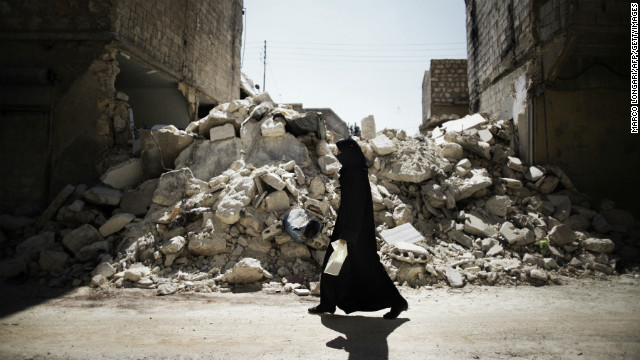 A woman walks past a destroyed building in Aleppo on September 13.
A woman walks past a destroyed building in Aleppo on September 13. 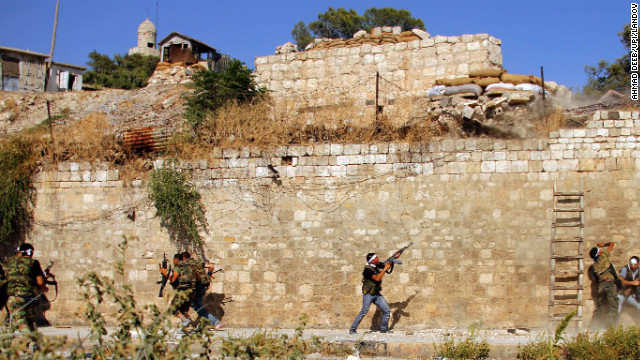 Free Syrian Army fighters battle during street fighting against Syrian army soldiers in Aleppo on September 8.
Free Syrian Army fighters battle during street fighting against Syrian army soldiers in Aleppo on September 8.  A Syrian man wounded by shelling sits on a chair outside a closed shop in Aleppo on September 4.
A Syrian man wounded by shelling sits on a chair outside a closed shop in Aleppo on September 4.  A woman sits in her wheelchair next to her house, damaged by a Syrian air raid, near Homs on August 26.
A woman sits in her wheelchair next to her house, damaged by a Syrian air raid, near Homs on August 26.  Members of the Free Syrian Army clash with Syrian army soliders in Aleppo's Saif al-Dawla district on August 22.
Members of the Free Syrian Army clash with Syrian army soliders in Aleppo's Saif al-Dawla district on August 22. 
 A man mourns in front of a field hospital on August 21 in Aleppo.
A man mourns in front of a field hospital on August 21 in Aleppo. 
 Wounded civilians wait in a field hospital after an air strike on August 21 in Aleppo.
Wounded civilians wait in a field hospital after an air strike on August 21 in Aleppo.  People pray during the funeral of a Free Syrian Army fighter, Amar Ali Amero, on August 21.
People pray during the funeral of a Free Syrian Army fighter, Amar Ali Amero, on August 21.  A man cries near the graves of his two children killed during a recent Syrian airstrike in Azaz on August 20.
A man cries near the graves of his two children killed during a recent Syrian airstrike in Azaz on August 20. 
 A Syrian woman holds her dead baby as she screams upon seeing her husband's body being covered following an airstrike by regime forces on the town of Azaz on August 15.
A Syrian woman holds her dead baby as she screams upon seeing her husband's body being covered following an airstrike by regime forces on the town of Azaz on August 15.  A Syrian rebel runs in a street of Selehattin during an attack on the municipal building on July 23.
A Syrian rebel runs in a street of Selehattin during an attack on the municipal building on July 23.  Syrian rebels hunt for snipers after attacking the municipality building in the city center of Selehattin on July 23.
Syrian rebels hunt for snipers after attacking the municipality building in the city center of Selehattin on July 23.  Members of the Free Syrian Army's Mugaweer (commandos) Brigade pay their respects in a cemetery on May 12 in Qusayr.
Members of the Free Syrian Army's Mugaweer (commandos) Brigade pay their respects in a cemetery on May 12 in Qusayr. 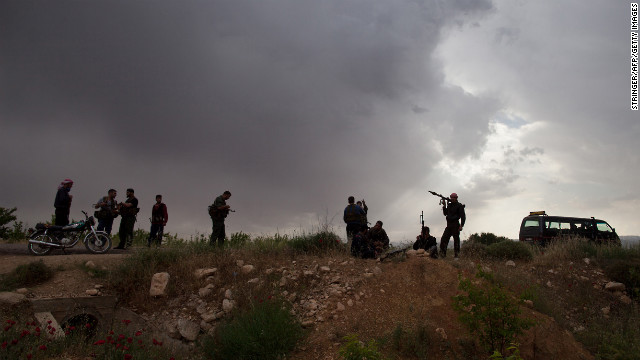 Syrian rebels take position near Qusayr on May 10.
Syrian rebels take position near Qusayr on May 10.  A Free Syrian Army member takes cover in underground caves in Sarmin on April 9.
A Free Syrian Army member takes cover in underground caves in Sarmin on April 9.  Rebels prepare to engage government tanks that advanced into Saraquib on April 9.
Rebels prepare to engage government tanks that advanced into Saraquib on April 9.  Men say prayers during a ceremony in Binnish on April 9.
Men say prayers during a ceremony in Binnish on April 9.  A young boy plays with a toy gun in Binnish on April 9.
A young boy plays with a toy gun in Binnish on April 9.  A Free Syrian Army rebel mounts his horse in the Al-Shatouria village near the Turkish border in northwestern Syria on March 16, a year after the uprising began.
A Free Syrian Army rebel mounts his horse in the Al-Shatouria village near the Turkish border in northwestern Syria on March 16, a year after the uprising began. 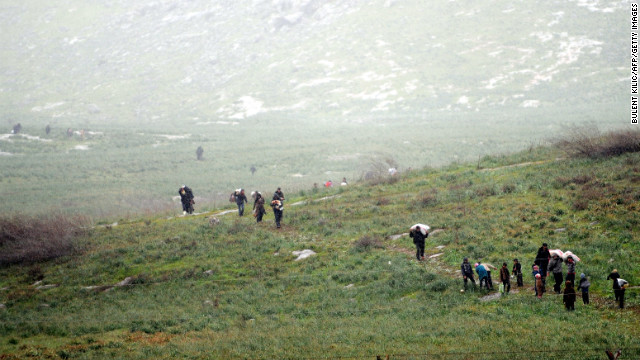 Syrian refugees walk across a field before crossing into Turkey on March 14.
Syrian refugees walk across a field before crossing into Turkey on March 14. 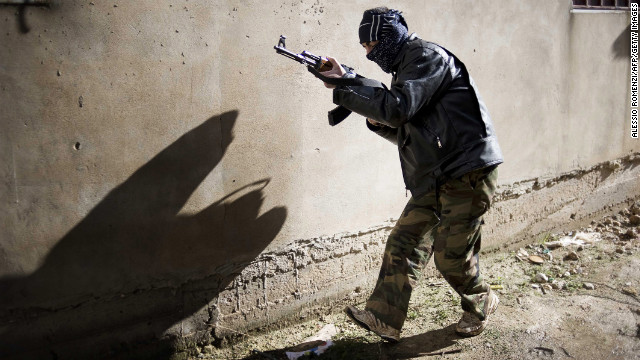 A rebel takes position in Al-Qsair on January 27.
A rebel takes position in Al-Qsair on January 27.  A protester in Homs throws a tear gas bomb back towards security forces, on December 27, 2011.
A protester in Homs throws a tear gas bomb back towards security forces, on December 27, 2011.  A man stands under a giant Syrian flag outside the Umayyad Mosque in Damascus on December 24, 2011.
A man stands under a giant Syrian flag outside the Umayyad Mosque in Damascus on December 24, 2011.  A member of the Free Syrian Army looks out over a valley in the village of Ain al-Baida on December 15, 2011.
A member of the Free Syrian Army looks out over a valley in the village of Ain al-Baida on December 15, 2011. 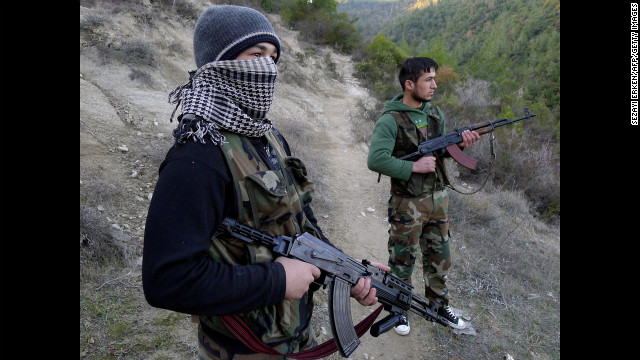 Members of the Free Syrian Army stand in an valley near the village of Ain al-Baida, close to the Turkish border, on December 15, 2011.
Members of the Free Syrian Army stand in an valley near the village of Ain al-Baida, close to the Turkish border, on December 15, 2011.  Displaced Syrian refugees walk through an orchard adjacent to Syria's northern border with Turkey on June 14, 2011, near Khirbet al-Jouz.
Displaced Syrian refugees walk through an orchard adjacent to Syria's northern border with Turkey on June 14, 2011, near Khirbet al-Jouz. 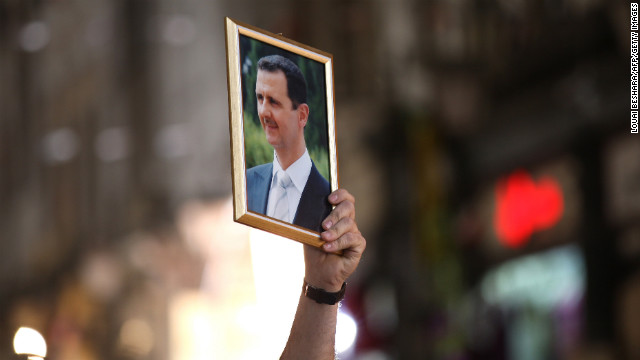 A Syrian man holds up a portrait of President Bashar al-Assad during a rally to show support for the president in Damascus on April 30, 2011.
A Syrian man holds up a portrait of President Bashar al-Assad during a rally to show support for the president in Damascus on April 30, 2011.  Syrians rally to show their support for President Bashar al-Assad in Damascus on April 30, 2011.
Syrians rally to show their support for President Bashar al-Assad in Damascus on April 30, 2011.  A screen grab from YouTube shows thick smoke rising above as Syrian anti-government protesters demonstrate in Moaret Al-Noman on April 29, 2011.
A screen grab from YouTube shows thick smoke rising above as Syrian anti-government protesters demonstrate in Moaret Al-Noman on April 29, 2011.  A screen grab from YouTube shows Syrian anti-government protesters run for cover from tear gas fired by security forces in Damascus on April 29, 2011, during the "Day of Rage" demonstrations called by activists to put pressure on al-Assad.
A screen grab from YouTube shows Syrian anti-government protesters run for cover from tear gas fired by security forces in Damascus on April 29, 2011, during the "Day of Rage" demonstrations called by activists to put pressure on al-Assad.  Syrians wave their national flag and hold portraits of al-Assad during a rally to show their support for their leader in Damascus on March 29, 2011.
Syrians wave their national flag and hold portraits of al-Assad during a rally to show their support for their leader in Damascus on March 29, 2011.  A woman sits by the hospital bed of a man allegedly injured when an armed group seized rooftops in Latakia on March 27, 2011, and opened fire at passers-by, citizens and security forces personnel according to official sources.
A woman sits by the hospital bed of a man allegedly injured when an armed group seized rooftops in Latakia on March 27, 2011, and opened fire at passers-by, citizens and security forces personnel according to official sources.  Syrian protesters chant slogans in support of al-Assad during a rally in Damascus on March 25, 2011.
Syrian protesters chant slogans in support of al-Assad during a rally in Damascus on March 25, 2011. 
1

2

3

4

5

6

7

8

9

10

11

12

13

14

15

16

17

18

19

20

21

22

23

24

25

26

27

28

29

30

31

32

33

34

35

36

37

38

39

40

41

42

43

44

45

46

47

48

49

50

51

52

53

54

55

56

57

58

59

60

61

62

63

64

65

66

67

68

69

70

71

72

73

74

75

76

77

78

79

80

81

82

83

84

85

86

87

88

89

90

91

92

93

94

95

96

97

98

99

100

101

102

103

104

105

106

107

108

109

110

111

112

113

114

115

116

117

118

119

120

121

122

123

124

125

126

127

128

129

130

131

132

133

134

135

136

137

138

139

140

141

142

143

144

145

146

147
 Syrian civil war in photos
Syrian civil war in photos  Syrian refugees arrive at the Turkish border gate of Cilvegozu on Thursday, September 5. The U.N. refugee agency said the number of Syrians who have fled their war-ravaged country has risen to more than 2 million.
Syrian refugees arrive at the Turkish border gate of Cilvegozu on Thursday, September 5. The U.N. refugee agency said the number of Syrians who have fled their war-ravaged country has risen to more than 2 million.  Syrian refugees gather in the village of Salkin after crossing the Syrian-Turkish border on September 5.
Syrian refugees gather in the village of Salkin after crossing the Syrian-Turkish border on September 5. 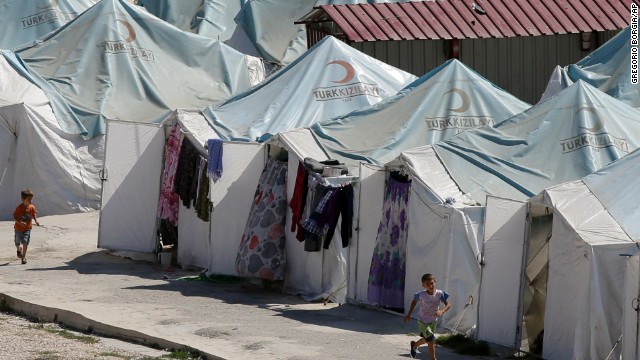 Children run past tents at a Syrian refugee camp in Yayladagi, Turkey, on September 3.
Children run past tents at a Syrian refugee camp in Yayladagi, Turkey, on September 3. 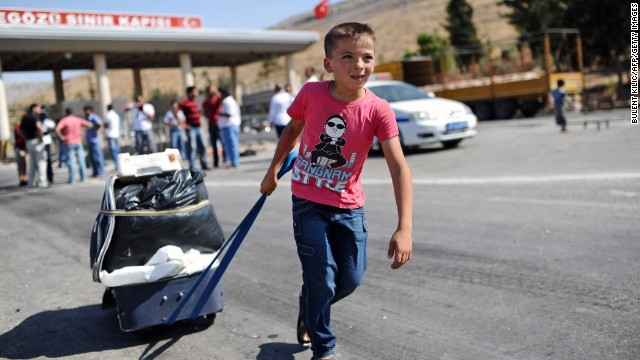 A child pulls a suitcase as Syrian refugees arrive at the Cilvegozu crossing gate of Reyhanli in Turkey's Hatay province on Saturday, August 31.
A child pulls a suitcase as Syrian refugees arrive at the Cilvegozu crossing gate of Reyhanli in Turkey's Hatay province on Saturday, August 31.  A family arrives from Syria at the Zaatari refugee camp in Jordan on Friday, August 30. Currently, Jordan has 515,000 registered Syrian refugees.
A family arrives from Syria at the Zaatari refugee camp in Jordan on Friday, August 30. Currently, Jordan has 515,000 registered Syrian refugees. 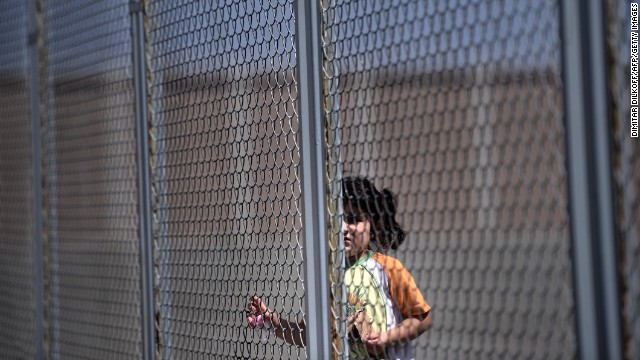 A Syrian girl stands behind a fence at Bulgaria's shelter near Lyubimets on August 28. More than 3,100 immigrants -- half of them Syrians -- have crossed into Bulgaria from neighboring Turkey this year, doubling their numbers compared with 2012 and and causing Bulgaria's few temporary accommodation facilities to overflow.
A Syrian girl stands behind a fence at Bulgaria's shelter near Lyubimets on August 28. More than 3,100 immigrants -- half of them Syrians -- have crossed into Bulgaria from neighboring Turkey this year, doubling their numbers compared with 2012 and and causing Bulgaria's few temporary accommodation facilities to overflow.  A wounded Syrian child is treated at the Israeli Ziv hospital on Wednesday, August 28, in the northern town of Safed, Israel. About 140 wounded Syrians, who have been fighting across the border from Israel, have been treated in Israeli hospitals since the beginning of the Syrian Civil war.
A wounded Syrian child is treated at the Israeli Ziv hospital on Wednesday, August 28, in the northern town of Safed, Israel. About 140 wounded Syrians, who have been fighting across the border from Israel, have been treated in Israeli hospitals since the beginning of the Syrian Civil war.  A Syrian-Kurdish man carries a mattress at sunset at the Quru Gusik refugee camp, east of Arbil, the capital of the autonomous Kurdish region of northern Iraq, on Tuesday, August 27. More than 50,000 Syrian refugees have crossed into Iraq's Kurdish region in less than two weeks as authorities rush to house them in more permanent camps.
A Syrian-Kurdish man carries a mattress at sunset at the Quru Gusik refugee camp, east of Arbil, the capital of the autonomous Kurdish region of northern Iraq, on Tuesday, August 27. More than 50,000 Syrian refugees have crossed into Iraq's Kurdish region in less than two weeks as authorities rush to house them in more permanent camps.  Syrian refugees listen to safety instructions at the Quru Gusik refugee camp on Saturday, August 24.
Syrian refugees listen to safety instructions at the Quru Gusik refugee camp on Saturday, August 24.  Syrian refugees at the Zaatari refugee camp on Thursday, July 18, near the Jordanian city of Mafraq, near the Jordanian-Syrian border.
Syrian refugees at the Zaatari refugee camp on Thursday, July 18, near the Jordanian city of Mafraq, near the Jordanian-Syrian border.  The expanse of the Zaatari refugee camp in Jordan as seen from an aerial view on July 18. The camp was opened on July 28, 2012, and is home to more than 130,000 refugees.
The expanse of the Zaatari refugee camp in Jordan as seen from an aerial view on July 18. The camp was opened on July 28, 2012, and is home to more than 130,000 refugees.  Syrian refugee children walk in the Bab al-Salam refugee camp in Syria's northern city of Azaz on Monday, July 15.
Syrian refugee children walk in the Bab al-Salam refugee camp in Syria's northern city of Azaz on Monday, July 15.  A boy walks with jugs of water on June 27 in a neighborhood in Beirut, Lebanon, with a high concentration of Syrian refugees. Since January, the number of Syrian refugees in Lebanon has more than tripled.
A boy walks with jugs of water on June 27 in a neighborhood in Beirut, Lebanon, with a high concentration of Syrian refugees. Since January, the number of Syrian refugees in Lebanon has more than tripled.  Syrian refugees stand with their belongings on June 20, World Refugee Day, at Zaatari refugee camp in Jordan.
Syrian refugees stand with their belongings on June 20, World Refugee Day, at Zaatari refugee camp in Jordan.  A Syrian woman and child look out of a refugee camp window on June 20 in Alman, Lebanon, after fleeing their hometown in Idlib province, Syria.
A Syrian woman and child look out of a refugee camp window on June 20 in Alman, Lebanon, after fleeing their hometown in Idlib province, Syria.  A child, whose family fled violence in Syria, stands at the Arsal refugee camp on June 14 in Lebanon's Bekaa Valley.
A child, whose family fled violence in Syria, stands at the Arsal refugee camp on June 14 in Lebanon's Bekaa Valley. 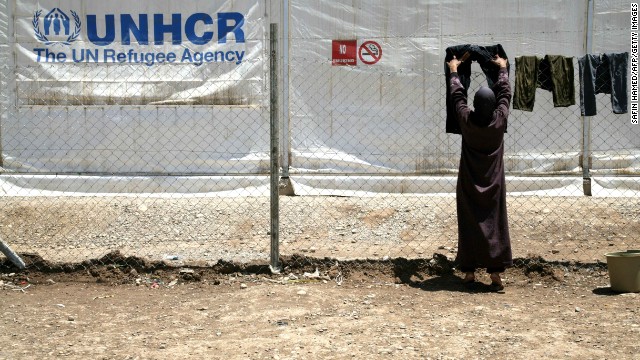 A woman uses a fence at the Domiz refugee camp near Kohuk, Iraq, to dry laundry on May 29.
A woman uses a fence at the Domiz refugee camp near Kohuk, Iraq, to dry laundry on May 29.  A boy carries a jug for water at the Maliber al-Salam refugee camp on April 28. The camp, located near the Turkish boarder, houses internally displaced Syrian families.
A boy carries a jug for water at the Maliber al-Salam refugee camp on April 28. The camp, located near the Turkish boarder, houses internally displaced Syrian families. 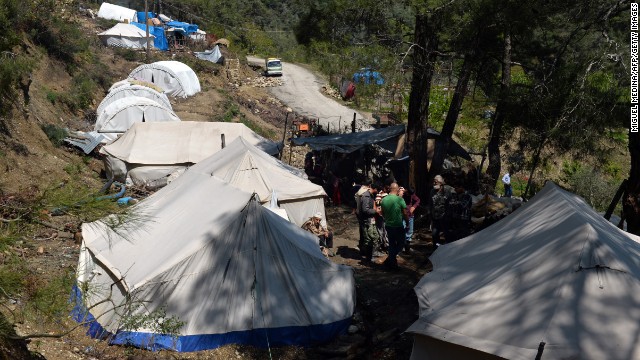 A makeshift refugee camp is seen near Syria's border with Turkey.
A makeshift refugee camp is seen near Syria's border with Turkey.  Row after row of temporary shelters fill the Maiber al-Salam refugee camp in Syria's Aleppo province, near the Turkish border on April 17.
Row after row of temporary shelters fill the Maiber al-Salam refugee camp in Syria's Aleppo province, near the Turkish border on April 17.  Refugees fleeing the conflict in Syria arrive February 18 at the Jordanian border.
Refugees fleeing the conflict in Syria arrive February 18 at the Jordanian border.  A Syrian girl stands at the entrance of a makeshift home near ruins in the ancient city of Serjilla in northwestern Syria on February 11. About half of Syria's refugees are children.
A Syrian girl stands at the entrance of a makeshift home near ruins in the ancient city of Serjilla in northwestern Syria on February 11. About half of Syria's refugees are children.  More than 400,000 people have fled Syria this year to countries including Lebanon, Jordan, Turkey, Iraq and Egypt. The Zaatari refugee camp is in Jordan, near the Syrian border.
More than 400,000 people have fled Syria this year to countries including Lebanon, Jordan, Turkey, Iraq and Egypt. The Zaatari refugee camp is in Jordan, near the Syrian border.  A refugee collects apples and some bread February 10 at the Azaz refugee camp along the Syrian-Turkish border. Turkey has spent more than $600 million setting up 17 refugee camps, with more under construction.
A refugee collects apples and some bread February 10 at the Azaz refugee camp along the Syrian-Turkish border. Turkey has spent more than $600 million setting up 17 refugee camps, with more under construction.  Clothes dry at the Qah refugee camp near the Turkish border on January 31. Many Syrians are forced to flee with few or no belongings.
Clothes dry at the Qah refugee camp near the Turkish border on January 31. Many Syrians are forced to flee with few or no belongings.  A man shows off his pet birds as new Syrian refugees arrive at the International Organization for Migration at the Zaatari refugee camp on January 30.
A man shows off his pet birds as new Syrian refugees arrive at the International Organization for Migration at the Zaatari refugee camp on January 30.  A refugee child gets a haircut at a makeshift barbershop at the Azaz refugee camp on February 19.
A refugee child gets a haircut at a makeshift barbershop at the Azaz refugee camp on February 19.  Syrian children gather around women washing in the Zaatari refugee camp on January 31.
Syrian children gather around women washing in the Zaatari refugee camp on January 31.  A refugee visits a clinic with his child at the Azaz refugee camp on February 10.
A refugee visits a clinic with his child at the Azaz refugee camp on February 10.  Syrians put up tents at the Zaatari refugee camp on January 30.
Syrians put up tents at the Zaatari refugee camp on January 30.  The U.N. High Commissioner for Refugees supplied tents in Al-Marj, in the eastern Lebanese Bekaa Valley. Some families have endured frigid weather in tent camps or struggle to pay for shelter.
The U.N. High Commissioner for Refugees supplied tents in Al-Marj, in the eastern Lebanese Bekaa Valley. Some families have endured frigid weather in tent camps or struggle to pay for shelter.  A Syrian girl looks through the window of a bus where she has lived with her family for the past eight months at a refugee camp in Bab al-Salam on the Syria-Turkey border on February 28.
A Syrian girl looks through the window of a bus where she has lived with her family for the past eight months at a refugee camp in Bab al-Salam on the Syria-Turkey border on February 28.  A Syrian jumps across the border between the Syrian town of Ras al-Ain and Ceylanpinar in Turkey's Sanliurfa province on November 10, 2012.
A Syrian jumps across the border between the Syrian town of Ras al-Ain and Ceylanpinar in Turkey's Sanliurfa province on November 10, 2012.  A Syrian refugee waits November 27, 2012, at a hairdresser's shop, where refugees can also receive training, inside the Oncupinar camp in Kilis, southern Turkey.
A Syrian refugee waits November 27, 2012, at a hairdresser's shop, where refugees can also receive training, inside the Oncupinar camp in Kilis, southern Turkey.  A Syrian boy attends school in the Turkish town of Kilis on December 17, 2012.
A Syrian boy attends school in the Turkish town of Kilis on December 17, 2012. 
1

2

3

4

5

6

7

8

9

10

11

12

13

14

15

16

17

18

19

20

21

22

23

24

25

26

27

28

29

30

31

32

33

34

35
 Photos: Syria's refugee crisis
Photos: Syria's refugee crisis An expected Republican presidential contender, Florida Sen. Marco Rubio, on Wednesday demonstrated the art of present and future political messaging in his statement explaining why he voted against a resolution authorizing limited military strikes in response to what he agreed was Syria's use of banned chemical weapons.
Rubio blamed the Obama administration for mishandling U.S. reaction to Syria's civil war, with help from Republican isolationists, by failing to strongly back opposition rebels when the conflict erupted in 2011.
While he called then for "a more robust engagement" to help the Syrian people topple Syrian leader Bashar al-Assad, Rubio said, he never advocated the use of U.S. military might in the conflict.
"Had we forcefully engaged in empowering moderate rebels, today we would have more and better options before us," he said. "But instead, unfortunately, the president, with the support of some voices in my own party, chose to let others lead instead. And now we are dealing with the consequences of that inaction."
That stance protected his conservative credentials by asserting military expertise, and also implicitly criticized two potential rivals for the White House in 2016 -- former Secretary of State Hillary Clinton and GOP Sen. Rand Paul of Kentucky.
As Obama's top diplomat, Clinton is automatically associated with the administration's response to the Syrian crisis until she stepped down early this year and was succeeded by John Kerry, a veteran Democratic senator.
House Dems proving tough sell for Obama on Syria
Clinton, who had pushed for arming the Syrian rebels but was overruled by Obama, is considered the frontrunner for the Democratic presidential nomination if she decides to run, which is widely expected. Her only statement so far on the current Syria question, issued by an aide, backed Obama's decision to seek congressional support for a military response.
Meanwhile, the libertarian Paul follows the same non-intervention policies espoused by his father, former GOP Rep. Ron Paul of Texas, who mounted several unsuccessful runs for president.
Like Rubio, Rand Paul also voted against the Syria authorization measure at Wednesday's meeting of the Senate Foreign Relations Committee, which passed it by a 10-7 margin.
To distinguish himself from Paul, Rubiov used his statement to directly attack what he called isolationist policies, saying: "Just because we ignore global problems doesn't mean they will ignore us."
"Instead, they become bigger and harder to solve, and sadly, Syria is just the latest example of that fundamental truth," Rubio said.
Another leading conservative voice, former U.S. Sen. Rick Santorum, adopted a similar stance to Rubio on Thursday, even though he had called for possible air strikes on Syria in March 2012 when he was seeking the Republican presidential nomination.
"Had President Obama and then-Secretary of State Hillary Clinton acted then in support of pro-democracy forces when that rebellion was taking place, we could have removed Assad and helped usher in stability for that country," Santorum said in a statement. "But we have a very different situation today. After nearly two years, 100,000 people killed, a rebel force comprised of al Qaeda and a Syrian regime in a much stronger position, a military strike would no longer be in our national security interest."
The positions of Rubio and Santorum follow a game plan laid out this week by Republican strategist Alex Castellanos, a CNN contributor, that called for GOP legislators to reject Obama's push for congressional authorization to attack Syria.
Though Obama "has told the country he has the power to intercede in Syria, he would like to make Congress 'President for a Day' so members can share his responsibility," Castellanos wrote in an opinion piece this week.
"Should Syria turn into a car wreck that lasts for years and further destabilizes what Obama's weakness has wrought in the Middle East, the president would prefer to be one of 536 decision-makers," he added, imploring House Republicans to block any vote on authorization.
The big debate: Should U.S. strike Syria?
Obama wants to punish al-Assad for what the United States calls a major chemical weapons attack on August 21 that killed more than 1,400 people in suburban Damascus.
He argues a failure to act puts at risk the credibility of international treaties banning weapons of mass destruction, which would represent a threat to the world.
Lacking international backing so far, the president is seeking congressional backing despite his insistence he has the power to order attacks based on national security interests.
However, support in Congress for a resolution authorizing limited military strikes -- expected to be missiles launched from Navy ships -- appears tenuous at this point despite intense lobbying by the president and top officials including Kerry.
Passage by the Democratic-led Senate is more likely than in the Republican-led House, but both parties lack unity on the issue so far.
Liberal Democrats who traditionally oppose war in any form reject the idea, as do libertarian Republicans like Paul who say it's none of our business.
Among those in the middle from either side, the main questions are whether the limited strikes Obama proposes will work, and if unintended consequences will lead to U.S. involvement in another war halfway around the world after more than a decade of fighting in Iraq and Afghanistan.
"We don't know what's going to happen the day after we bomb," Democratic Rep. Bill Pascrell of New Jersey said Thursday on CNN.
The Senate version of the resolution approved by the Foreign Relations Committee sets a 60-day deadline for use of force in Syria, with an option for an additional 30 days.
An amendment accepted by the panel from Republican Sen. John McCain of Arizona and Democratic Sen. Christopher Coons of Delaware added language to say the military response was intended to reverse Assad's battlefield momentum, a stronger objective than had been outlined by administration officials.
The resolution also makes clear there would be no U.S. boots on the ground as part of a response in Syria. It now goes to the full Senate for an expected vote next week, when the House also will take up the issue.
Interactive: How the House and Senate will vote.
A concern for House members and senators facing re-election next year is a primary challenge by a more extreme candidate who could attack them for backing the president's proposed military move.
Already, Senate Republican leader Mitch McConnell of Kentucky and veteran GOP Sen. Mike Enzi of Wyoming face primary races against opponents claiming stronger conservative credentials. Both McConnell and Enzi are undecided on a military response in Syria.
With polls showing public opposition to a military attack on Syria, legislators are facing pressure at home. Democratic Sen. Dianne Feinstein of California, who chairs the Senate Intelligence Committee, acknowledged Thursday that her constituents don't like the resolution.
"Every day I get a report on what the calls are, where the calls are coming from, what the nature of the argument is and there is no question that what is coming in is overwhelmingly negative," said Feinstein, who then added that "they don't know what I know, they haven't heard what I've heard."
A supporter of a military response in Syria who won re-election last year, Feinstein I like to believe now after 20 years I have some skill in separating the wheat from the chaff in this thing."
However, GOP Rep. Matt Salmon of Arizona said he remained unconvinced.
"I agree that there are sometimes that you need to just go out and lead and do what you believe is the right thing to do and hope that you can convince the people to follow," Salmon told CNN. "But, right now, I don't think that this administration has provided a very, very winning argument or series of arguments that we should engage in this conflict."
Syria: What do the neighbors think of potential Western strikes?
CNN's Paul Steinhauser, Ashley Killough, Deirdre Walsh and J. Byron Wolf contributed to this report.







